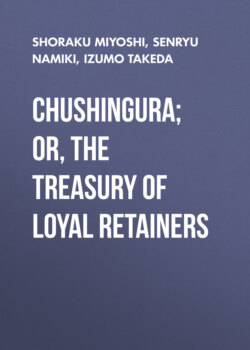Читать книгу Chushingura; Or, The Treasury of Loyal Retainers - Shoraku Miyoshi - Страница 6
На сайте Литреса книга снята с продажи.
THE PERIOD OF THE AKO VENDETTA.
ОглавлениеTable of Contents
In spite of these linguistic difficulties, an attempt has been made, it is to be hoped not altogether without success, to give in the present work the plot and spirit of the Chushingura; but for the full comprehension of the play and its motif, the reader should possess some acquaintance with the social condition, manners, and ideas of the time to which it refers.
The vendetta of the retainers of Ako, which forms the subject of the play, took place early in 1703; and the play saw the light forty-five years later, in 1748. It was a production of the golden age of Tokugawa literature. During the little more than a century and a half that have since elapsed, remarkable changes have come over society. The peace which had lasted under the Tokugawa Shogunate for two centuries and a half was rudely broken by the cannon’s roar off the coast of Uraga; and soon after, with the Restoration of the Imperial authority, the nation began to introduce the civilisation of the West. Our wars with China and Russia have greatly influenced the whole society, and our customs and manners undergone marked changes. In these days it is difficult to form a clear idea of the state of society under the feudal régime. Few of those people to-day who leave Shimbashi by the night express to awake next morning at Kobe have a definite conception of the daimyo’s procession that used to be borne on the shoulders of coolies across the River Oi which they pass in their sleep. The postal halting-places have become railway stations, and express couriers have been replaced by telegraph. And we can hardly imagine how cheap life was held in the old times when, for the loss of their lord’s treasured article, retainers who had faithfully served him and his fathers had to surrender their lives and family estates; and we can hardly bring ourselves into sympathy with those lovers who, taking their lives into their own hands, have become subjects of songs for their suicide. When even we Japanese at the present time are thus out of touch with much that was of common occurrence in our forefathers’ days two centuries ago, it is only to be expected that Old Japan should appear almost incomprehensible to the Western peoples whose manners, customs, and ways of life are totally different to ours. It is therefore believed that it would not be an altogether needless task to make a few remarks here on the condition, manners, and thought of society at that time.
